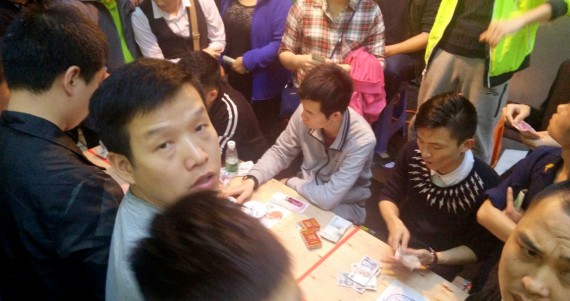New Year gambling hints at Chinese entrepreneurial vigour — The Financial Times
–
With about every major leading economic indicator in a tailspin, it’s easy, even obvious, to be bearish about China. But, one sign of economic activity could hardly seem more robust: the crowds and cash at gambling tables during this year’s Chinese New Year.
The two-week long lunar New Year celebration finally drew to a close on Monday with the Lantern Festival. Here in Shenzhen, China’s richest city per capita, no sooner do the shops all shut down for the long break than the gambling tables spill out onto the street, like the cork flying out of a bottle.
Gambling, especially in public places with large sums being wagered, is illegal everywhere in China. All the same, the New Year is ready-made for gamblers and street-corner croupiers to gather. For one thing, most police and urban street patrols are also away from their jobs with family.
Along with over-eating and giving cash-stuffed red envelopes, gambling is the other main popular indulgence during the New Year. Most of it happens behind closed doors with families gathered around the mahjong and card table. But parts of Shenzhen soon take on the appearance of an al fresco Macau (see photo).
—
—
—
–
This year, from what I could see, the number of punters and sums being wagered was far higher than years past. This matters not only as a statement of consumer optimism here but also as affirmation of the love of risk-taking that helps make China such a hotbed of entrepreneurial activity.
The two forces operating together – not only at street corner casinos — are perhaps the best reason to be optimistic that China’s economy may yet avoid a “hard landing†and continue to thrive.
In my neighborhood, the favorite game on the street is a form of craps where people bet on which of six auspicious animals and lucky symbols will turn up. Hundreds of renminbi change hands with each roll. No small bets allowed. The gambling goes on from morning until late at night.
It’s a game that requires no skill and one that also gives the house a huge advantage, since winning bets only make four times the sum wagered. This puts it in a somewhat similar league with punto banco baccarat, the casino game Chinese seem to like the most. It’s also game of pure chance, where the house has a built-in edge.
In China, gamblers’ capital flows to games with unfair odds, where dumb luck counts for more than smarts. In this there is cogent parallel with the investment culture in China. China is simply awash in risk-loving risk capital.
Street-side gambling is popular during the New Year break in part because the other more organised mainstream forms of taking a punt are shut down. Top of the list, of course, is the Chinese domestic stock market. It’s rightly called the world’s largest gambling den. Shares bob up and down in unison, prices decoupled from underlying economic factors, a company’s own prospects or comparable valuations elsewhere.
The simple reason is that almost all shares are owned by individual traders. Fed on rumors and goaded by state-owned brokerage houses, they seem to give no more thought to which shares to buy than my neighbors do before betting Rmb200 on which dice will land on the lucky crab.
The housing market, too, traces a similar erratic arc, driven far more by short-term speculation than the need to put a roof over one’s head. Billions pour in, bidding up local housing prices in many Chinese cities to a per-square-foot level higher than just about anywhere in the West except London, Paris, New York and San Francisco. Eventually prices do begin to moderate or even fall, as happened in most smaller cities this past twelve months.
The other big pool of risk capital in China goes into direct investment in entrepreneurial ventures of all sizes and calibers. Nowhere in the world is it easier to raise money to start or grow a business than China. In part, because Chinese have a marked preference for being their own boss, so the number of new companies started each year is high. The other big factor, call it the demand side, is that there is both a lot of money available and a great enthusiasm for investing in the new, the untried, the risky.
Before coming here, I used to work in the venture capital industry in California. VCs there are occasionally accused of turning a blind eye toward risk. Compared to venture investing in China, however, even the most starry-eyed venture investor in Silicon Valley looks like a Swiss money manager.
Just about any idea here seems to attract funding, a lot of it institutional. China now almost certainly has more venture firms than the rest of the world combined. No one can keep proper count. Along with all the big global names like Sequoia and Kleiner Perkins, there are thousands of other China-only venture firms operating, along with at least as many angel groups. In addition, just about every Chinese town, city and province, along with most listed companies, have their own venture funds.
I marvel at the ease with which early-stage businesses get funded, the valuations they command and the less than diligent due diligence that takes sometimes place before money moves. Of course, a few of these venture-backed companies hit the jackpot.
Alibaba or Tencent are two that come to mind. But, initial public offering (IPO) exits for Chinese startups remain rare, and so taken as a whole, venture investing returns in China have proved meager. But, activity never seems to wane. Fad follows fad. From group shopping, to what’s known in China as “O2O†(offline-to-online) thousands of companies get started, funded and then often within less than 18 months, go pffft.
With the New Year celebrations winding down, the outdoor gambling tables in my neighborhood are being put away for another year. Work schedules are returning to normal. For all the headwinds China’s economy now faces, Chinese household savings are still apparently growing faster than GDP. This means Chinese will likely go on year-after-year amassing more money to invest, to gamble or to speculate.
Download Financial Times article






